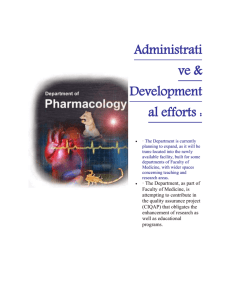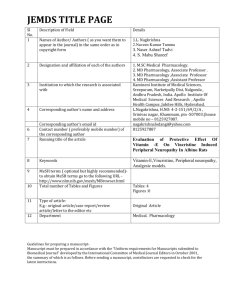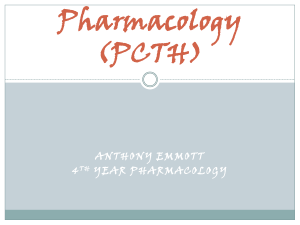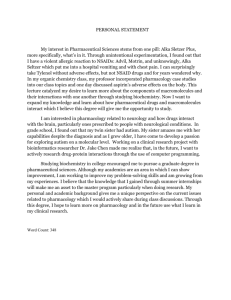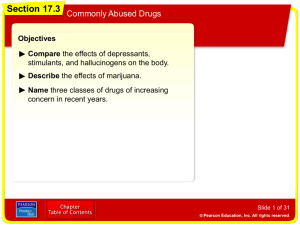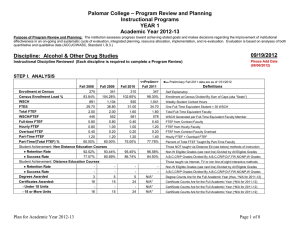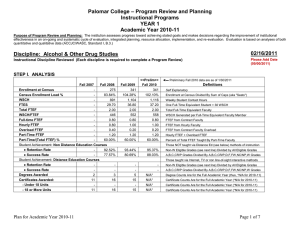syllabus
advertisement
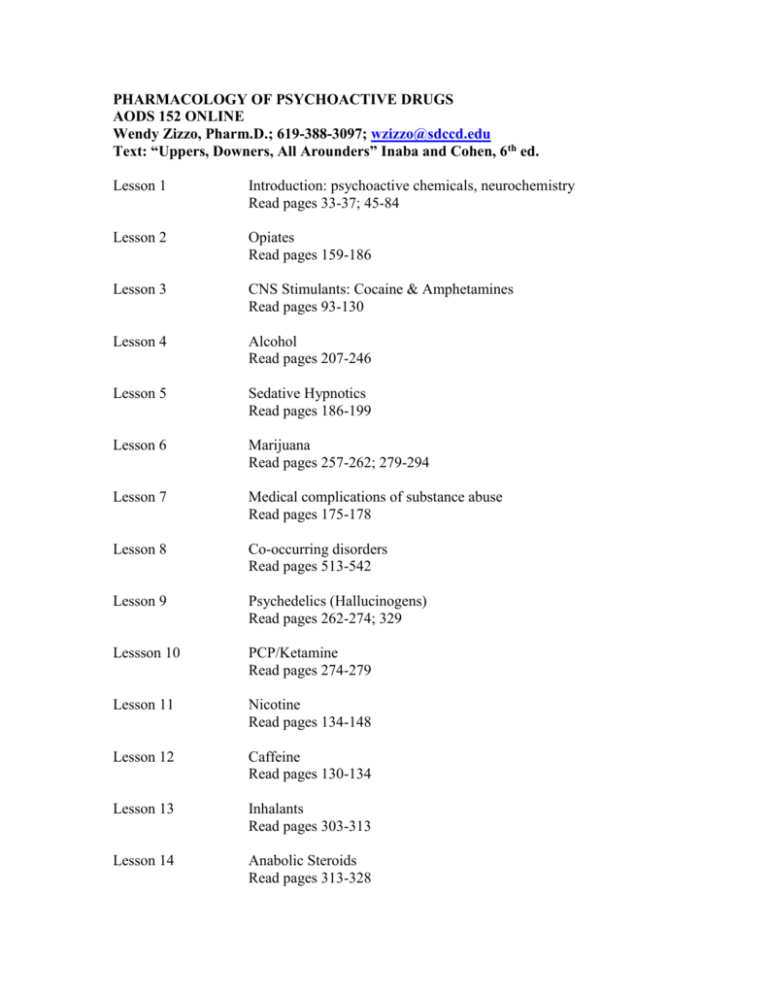
PHARMACOLOGY OF PSYCHOACTIVE DRUGS AODS 152 ONLINE Wendy Zizzo, Pharm.D.; 619-388-3097; wzizzo@sdccd.edu Text: “Uppers, Downers, All Arounders” Inaba and Cohen, 6th ed. Lesson 1 Introduction: psychoactive chemicals, neurochemistry Read pages 33-37; 45-84 Lesson 2 Opiates Read pages 159-186 Lesson 3 CNS Stimulants: Cocaine & Amphetamines Read pages 93-130 Lesson 4 Alcohol Read pages 207-246 Lesson 5 Sedative Hypnotics Read pages 186-199 Lesson 6 Marijuana Read pages 257-262; 279-294 Lesson 7 Medical complications of substance abuse Read pages 175-178 Lesson 8 Co-occurring disorders Read pages 513-542 Lesson 9 Psychedelics (Hallucinogens) Read pages 262-274; 329 Lessson 10 PCP/Ketamine Read pages 274-279 Lesson 11 Nicotine Read pages 134-148 Lesson 12 Caffeine Read pages 130-134 Lesson 13 Inhalants Read pages 303-313 Lesson 14 Anabolic Steroids Read pages 313-328 PHARMACOLOGY OF PSYCHOACTIVE DRUGS AODS 152 ONLINE Wendy Zizzo, Pharm.D. Content: Pharmacology of abused substances. This class will cover the neurochemistry, symptoms of intoxication and withdrawal, and treatment strategies for commonly abused substances. Course Objectives: 1. Understand the neurochemical effects of commonly abused substances. 2. Identify the physical and mental effects of commonly abused substances. 3. Identify potential hazards including withdrawal symptoms associated with specific abused substances. 4. Discuss therapeutic approaches to the management of chemical dependency. GRADING POLICY 10% discussion postings 10% Quiz I 10% Quiz II 20% research paper 20% midterm 30% final exam 90-100% 80-89% 70-79% 60-69% 0-59% =A =B =C =D =F Exams will be true/false and multiple choice. There will be no makeup exams. The final exam is comprehensive. Required text: “Upper, Downers, All Arounders”, D. Inaba, 6th edition. Optional text: “Drugs, the brain, and behavior, The pharmacology of abuse and dependence”, Brick and Erikson. Contacting me: #619-388-3097; wzizzo@sdccd.edu; office A-1R **CHEATING POLICY** According to the SDCC Catalog “honesty and integrity are integral components of the academic process. Students are expected to be honest and ethical at all times in their pursuit of academic goals…” No form of cheating will be tolerated, and any student caught cheating will face disciplinary action, and may be failed. The first offense will result in a zero grade for the assignment and a referral to Dean Mario Chacon for counseling. The student will not be allowed to return to the classroom until after meeting with Dean Chacon. The second offense will result in an F grade for the course. Cheating includes plagiarism from all sources, including the Internet. Plagiarism is any one of the following: a) verbatim copying without proper acknowledgment of the source; b) paraphrasing without proper acknowledgment; c) putting together a “patchwork” paper from diverse sources without proper acknowledgment; d) unacknowledged appropriation of information or of someone else’s ideas. Student responsibilities: The SDCC catalog states that ‘No students may interfere with a student’s opportunity to learn’. You will be dropped from the class if you exhibit behavior which prohibits or impedes any member of the class from pursuing any class assignment objective or learning opportunity within the classroom, or if you fail to demonstrate sufficient academic progress as specified at the beginning of the semester by the written grading and performance standards for the course. Notification of this failure may be made though grading procedures, conferences, or official notification. Code of conduct: Under the code of conduct stated in the SDCC Catalog, the following behaviors (in addition to others not stated here) will not be tolerated: physical or verbal intimidation or harassment; disorderly, lewd, indecent or obscene conduct; assault or battery upon a student or district personnel. Student Grievances: The instructor is concerned about you and your educational progress. It is understood that disagreements and misunderstandings may occur, and you should be aware that there is a college procedure for resolution of grievances. If you have an unresolved conflict during the class, you must first contact the course instructor in an attempt to resolve the problem. Most disagreements are resolved at these meetings. If the results are unsatisfactory, you should next contact the AODS Program Director, Jimmy Evans. In the event you are still not satisfied, contact the Behavioral Sciences Department Chairperson, Steve Bouscaren. If the results are still unsatisfactory, you should contact the School Dean. Students with disabilities: Students with disabilities who may need academic accommodations should discuss options with their professor during the first two weeks of class. Add/ Drop Dates: The last day to receive an add code from a City College instructor and add a class is Friday September 5, 2008. The last day to drop the class without a “W” on your record is Friday September 5, 2008. The last day to drop and be eligible for refund of enrollment fees is Monday September 8, 2008. The last day to drop the class without receiving a letter grade is, Friday October 31, 2008. It is your responsibility to add, drop or withdraw from classes before the deadlines listed above. If you decide to drop the course, you must do so by Friday October 31, 2008, or you will receive a letter grade for the course. GUIDELINES FOR WRITING ASSIGNMENT FOR AODS 152 ONLINE Wendy Zizzo, PharmD Assignment: 3 page, typed (12 point font), double-spaced, one-inch margins paper. Papers must be submitted through the online course. Pick a drug of abuse or a drugrelated topic, such as needle exchange, secondhand smoke, fetal alcohol syndrome, etc. You will need a minimum of three references cited in bibliography form. Recent references are better than very old ones. I strongly recommend that you have someone proofread your paper for spelling, punctuation, grammar and clarity. You will be graded not only on content, but also on mechanics and grammar.


